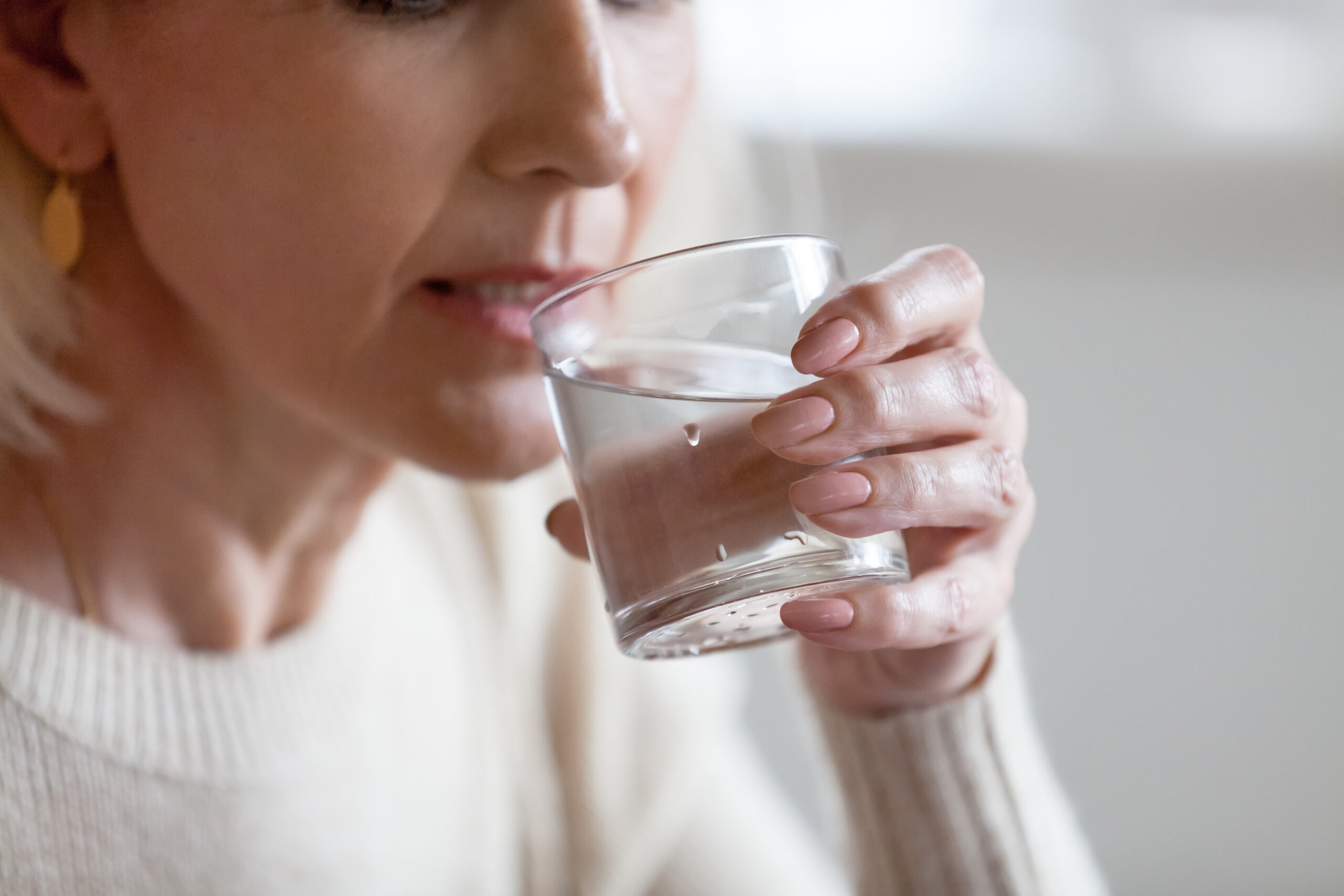Why Do I Always Feel Dehydrated – Water, Electrolytes, Or An Underlying Health Condition?
The most obvious reason why you always feel dehydrated is that you simply don’t drink enough water. The average person needs around 8 glasses of water per day to stay hydrated. However, this may vary depending on factors such as activity level, climate, and overall health. If you are not meeting your daily water intake, your body will become dehydrated.
Why Do I Always Feel Dehydrated – Lacking Electrolytes
Electrolytes play a crucial role in maintaining hydration levels in the body because they push water into the cells. Electrolytes, especially sodium, are required to achieve true hydration on the cellular level. If we don’t replenish these electrolytes, our body becomes dehydrated, even if we are drinking enough water. This is why it is important to consume enough salt, specifically, sea salt, as well as electrolyte-rich foods such as bananas, coconut water, and avocados.1 2
Sweating is the body’s natural way of regulating its temperature and getting rid of excess heat. However, excessive sweating leads to dehydration. If you exercise vigorously or live in a hot and humid climate, dehydration is a significant concern. If you are someone who sweats excessively, it is important to increase your fluid and electrolytes intake to compensate for the loss of fluids through sweat.3

Wait, Isn’t Salt Bad For Me?
As a health-conscious individual, you may have been told to limit your salt intake to maintain a healthy lifestyle. While this advice is prudent for those with kidney disease that is driving high blood pressure, for most healthy individuals, sufficient salt intake is required to optimize cellular function. While excessive consumption of sodium leads to high blood pressure and other health issues, not all salts are created equal.4
The main culprit behind the negative effects of salt is table salt or refined salt. This type of salt is heavily processed and stripped off its natural minerals, leaving behind only sodium chloride. On the other hand, unrefined salts like sea salt or Himalayan pink salt are something our bodies need and they also contain trace amounts of minerals such as magnesium, calcium, and potassium. These minerals not only add flavor to our food but also provide essential nutrients for our body.5

Salt Improves Adrenal Function
The adrenals are two small glands located on top of the kidneys. They play a crucial role in regulating many bodily functions, including metabolism, blood pressure, and stress response. The adrenals produce hormones such as cortisol and aldosterone that help the body cope with physical and emotional stress.
When we experience chronic stress or illness, our adrenal glands often become overworked. This leads to symptoms such as fatigue, weakened immune system, mood swings, and weight gain. In severe cases, it can even lead to conditions like Addison’s disease or Cushing’s syndrome.
One way to support adrenal function is by consuming adequate amounts of salt. When we are under stress, our bodies release aldosterone to increase the reabsorption of sodium and water in the kidneys. This helps maintain proper hydration levels and blood volume. However, chronic stress depletes our sodium stores, leading to imbalances in these hormones and further taxing the adrenals.
By consuming enough salt, we replenish our sodium levels and help regulate these important hormones. This allows our adrenals to function optimally and better cope with stressors.6
Why Do I Always Feel Dehydrated – Medications
Certain medications also cause dehydration as a side effect. Diuretics, which are commonly prescribed for conditions like hypertension and heart failure, increase urine production, leading to fluid loss from the body. Other medications such as antihistamines and laxatives also have a dehydrating effect. If you are taking any medication and experience frequent dehydration, consult with your doctor about potential side effects.7
Why Do I Always Feel Dehydrated – Diuretics – Coffee, Tea, And Alcohol
Coffee and tea are popular beverages around the world and are consumed daily by many individuals. However, both coffee and tea have a diuretic effect on the body due to their caffeine content. Caffeine is a natural stimulant that increases urine production and results in fluid loss.
Despite this, studies have shown that moderate consumption of coffee and tea does not significantly contribute to dehydration in healthy individuals. This means that as long as you are consuming enough water along with your coffee or tea, you should not experience dehydration.
Alcohol is a diuretic and causes an increase in urine production, leading to dehydration. Drinking alcohol also inhibits the production of a hormone that helps our body retain water. This is why people wake up feeling dehydrated after a night of drinking. To avoid this, make sure to drink water between alcoholic beverages and consume plenty of fluids before going to bed.8
Why Do I Always Feel Dehydrated – Underlying Health Conditions
Dehydration is a symptom of an underlying health condition. An inability to regulate blood sugar, kidney disease, and thyroid disorders all cause excessive thirst and dehydration. If you have any of these conditions, it is important to get to the core of the problem.9
Targeting The Cause Of Underlying Health Conditions
The cause of nearly every degenerative disease is inflammation and specifically, cellular membrane inflammation. Chronic cellular membrane inflammation arises from a variety of sources, including environmental toxins, stress, poor diet, and undesirable epigenetic expression.
5Rs – Optimizing Cellular Function Is The Key To Feeling Well
I have developed a series of five steps that I call my 5Rs, as a roadmap for optimizing cellular function, thereby eliminating the cellular membrane inflammation that is the driving factor behind a whole host of chronic diseases.
R1 – Remove Stressors
Exposure to stressors like toxins need to be reduced as much as possible so our cells aren’t constantly bombarded by more poisons. Together, we can define which toxins and stressors you are being exposed to and discuss ways to remove them from your life.
R2 – Regenerating The Cellular Membrane
Toxins and other stressors damage our cellular membranes. As a result, cellular membrane inflammation ensues. Cellular membrane inflammation makes cells less permeable so they cannot take in new products or expel metabolic waste products. Overtime, this results in a backlog of toxins that slowly build up in the cell like a landfill.
Additionally, cellular membrane inflammation changes the shape of protein receptors. This modifies the function of hormone receptors making it hard for hormones to connect and send their message into the cell. This results in hormone resistance, as there are sufficient quantities of hormones floating throughout the blood, but they cannot attach to hormone receptors. The consequences of this are far reaching and are linked to insulin resistance, thyroid hormone resistance, and other degenerative diseases.10
R3 – Restoring Cellular ATP Production
R3 is based on restoring cellular health and vitality, specifically, revitalizing cellular ATP production. Toxins severely deplete ATP levels in our cells, leading to various health issues. This crucial molecule is responsible for providing the necessary energy for cells to thrive and carry out their functions effectively.
The goal of R3 is to optimize ATP production that in turn opens up detox pathways within the cell and boosts cellular function. With sufficient levels of ATP, the body can produce sufficient glutathione, a powerful antioxidant that facilitates detoxification, effectively eliminating toxic substances from our bodies.11
R4 – Downregulating Cellular Membrane Inflammation
R4 involves downregulating cellular membrane inflammation. As toxins are removed from cells, it is expected that the inflammation in the cellular membrane would naturally decrease. However, a complex feedback loop known as the NO/ONOO cycle maintains high levels of inflammation.12
By using specific nutraceuticals, we break this cycle and finally put an end to cellular membrane inflammation. This not only promotes better overall health, but also allows for optimal cellular function.
R5 – Reestablishing Methylation
Methylation is a vital process that occurs in our body. It involves transferring a methyl group (CH3) to different molecules, such as DNA, RNA, proteins, and lipids. This process plays a significant role in various functions of the body, including detoxification, hormone regulation, and gene expression.
However, due to factors like exposure to heavy metals and other environmental toxins, our methylation cycle becomes disrupted. This leads to a decrease in the production of methyl groups, which are essential for proper methylation.
One way to restore proper methylation is through the use of methyl donors. These are compounds that provide the necessary methyl groups for methylation to occur. By supplementing with methyl donors, we replenish our body’s supply of methyl groups and support the methylation process.
Apart from detoxification, methylation also plays a critical role in removing toxic hormone metabolites and regulating gene expression through epigenetics. Epigenetic regulation refers to the ability to turn on and off specific genes, which is crucial for turning off genes that promote disease.13
Why Do I Always Feel Dehydrated?
If you always feel dehydrated, start by consuming more water and electrolytes like sea salt. If symptoms persist, an underlying condition could be to blame. Getting to the root cause is the only long-term solution. By following the 5Rs to optimize cellular function, we target the core issue directly.
For more information on the 5Rs, join me in my free webinar or read more about the toxins in tap water.
References
1 Birukov A, Rakova N, Lerchl K, Olde Engberink RH, Johannes B, Wabel P, Moissl U, Rauh M, Luft FC, Titze J. Ultra-long-term human salt balance studies reveal interrelations between sodium, potassium, and chloride intake and excretion. Am J Clin Nutr. 2016 Jul;104(1):49-57. doi: 10.3945/ajcn.116.132951. Epub 2016 May 25. PMID: 27225435; PMCID: PMC4919532.
2 Shrimanker I, Bhattarai S. Electrolytes. [Updated 2023 Jul 24]. In: StatPearls [Internet]. Treasure Island (FL): StatPearls Publishing; 2024 Jan-. Available from: https://www.ncbi.nlm.nih.gov/books/NBK541123/
3 Baker LB. Physiology of sweat gland function: The roles of sweating and sweat composition in human health. Temperature (Austin). 2019 Jul 17;6(3):211-259. doi: 10.1080/23328940.2019.1632145. PMID: 31608304; PMCID: PMC6773238.
4 Taylor K, Jones EB. Adult Dehydration. [Updated 2022 Oct 3]. In: StatPearls [Internet]. Treasure Island (FL): StatPearls Publishing; 2024 Jan-. Available from: https://www.ncbi.nlm.nih.gov/books/NBK555956/
5 Lee BH, Yang AR, Kim MY, McCurdy S, Boisvert WA. Natural sea salt consumption confers protection against hypertension and kidney damage in Dahl salt-sensitive rats. Food Nutr Res. 2016 Dec 20;61(1):1264713. doi: 10.1080/16546628.2017.1264713. Erratum in: Food Nutr Res. 2017 Mar 20;61(1):1300375. PMID: 28325999; PMCID: PMC5328355.
6 Pazderska A, Pearce SH. Adrenal insufficiency – recognition and management. Clin Med (Lond). 2017 Jun;17(3):258-262. doi: 10.7861/clinmedicine.17-3-258. PMID: 28572228; PMCID: PMC6297573.
7 Puga AM, Lopez-Oliva S, Trives C, Partearroyo T, Varela-Moreiras G. Effects of Drugs and Excipients on Hydration Status. Nutrients. 2019 Mar 20;11(3):669. doi: 10.3390/nu11030669. PMID: 30897748; PMCID: PMC6470661.
8 Polhuis KCMM, Wijnen AHC, Sierksma A, Calame W, Tieland M. The Diuretic Action of Weak and Strong Alcoholic Beverages in Elderly Men: A Randomized Diet-Controlled Crossover Trial. Nutrients. 2017 Jun 28;9(7):660. doi: 10.3390/nu9070660. PMID: 28657601; PMCID: PMC5537780.
9 Lacey J, Corbett J, Forni L, Hooper L, Hughes F, Minto G, Moss C, Price S, Whyte G, Woodcock T, Mythen M, Montgomery H. A multidisciplinary consensus on dehydration: definitions, diagnostic methods and clinical implications. Ann Med. 2019 May-Jun;51(3-4):232-251. doi: 10.1080/07853890.2019.1628352. Epub 2019 Jun 17. PMID: 31204514; PMCID: PMC7877883.
10 Ammendolia, D.A., Bement, W.M. & Brumell, J.H. Plasma membrane integrity: implications for health and disease. BMC Biol 19, 71 (2021). https://doi.org/10.1186/s12915-021-00972-y
11 Zolkipli-Cunningham Z, Falk MJ. Clinical effects of chemical exposures on mitochondrial function. Toxicology. 2017 Nov 1;391:90-99. doi: 10.1016/j.tox.2017.07.009. Epub 2017 Jul 27. PMID: 28757096; PMCID: PMC6078194.
12 Pall M. L. (2013). The NO/ONOO-cycle as the central cause of heart failure. International journal of molecular sciences, 14(11), 22274–22330. https://doi.org/10.3390/ijms141122274
13 Dhar GA, Saha S, Mitra P, Nag Chaudhuri R. DNA methylation and regulation of gene expression: Guardian of our health. Nucleus (Calcutta). 2021;64(3):259-270. doi: 10.1007/s13237-021-00367-y. Epub 2021 Aug 16. PMID: 34421129; PMCID: PMC8366481.
Disclaimer: All rights reserved. Information provided is for general purposes and not intended to provide medical advice, diagnosis, or treatment. Consult your healthcare professional for medical concerns. About Dr. Pompa




